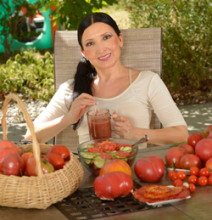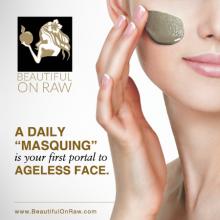Masks: Beyond the Obvious
Published: (August, 2020)

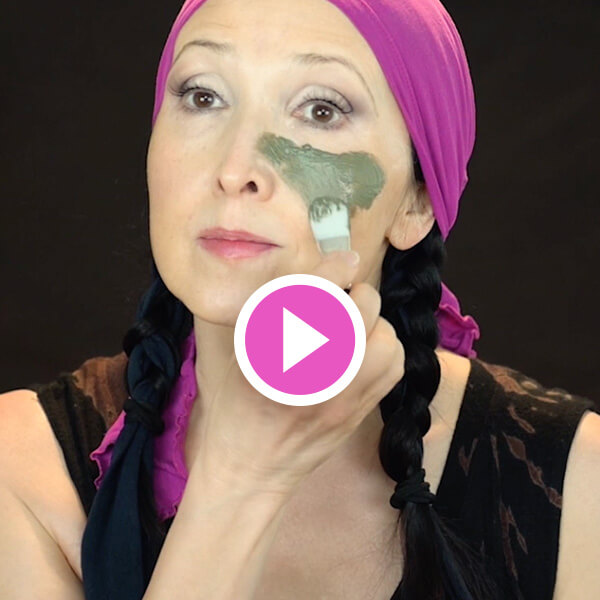
My video on daily masking prompted this comment:
Is a daily facial mask not abrasive to the skin? Doesn’t it pull out the excess moisture from the skin and dry it out?
Yes, that is the obvious approach, and one that most cosmetologists and skincare experts overwhelmingly follow… be very gentle with your skin to avoid dryness and irritations. But there is another side to this matter.
If you eat mostly raw and practice daily juicing, you can exfoliate really well. And exfoliating thoroughly is the only way to preserve a dewy complexion at any age—especially if, like me, you’re over 60.

I’ve done a daily mask for 30 years, and simply haven’t experienced any of the dryness that my correspondent refers to.
The mask itself isn’t at all abrasive for the skin. What’s more, you can use a mask-removing brush for additional exfoliation. But your skin needs be trained for this kind of treatment. That indeed is the core concept in my skin care approach—training the skin to resist aging.
Every issue you face has an obvious side and a more obscure aspect as well.
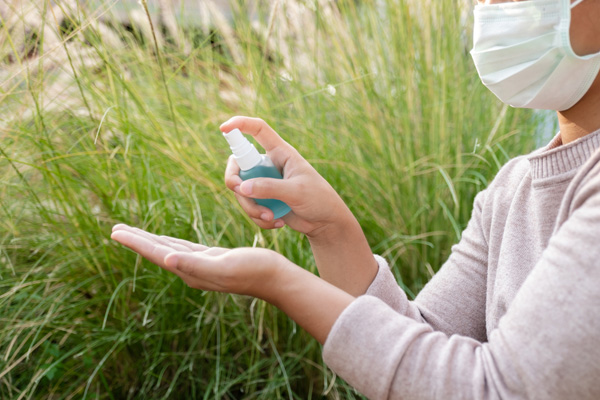
2. Danger of Cleanliness
Consider the COVID crisis. Facial coverings. Social distancing. Hand washing. These are obvious, reasonable solutions to protect ourselves and others. But there is a deeper side to these modes of protection that we must be cognizant of.
Being thoroughly protected is obviously the right action for people with underlying health conditions. But for healthy individuals, excessive cleanliness and protection can, in the long run, be a risky practice.
On the internet, you’ll find quite a few articles by epidemiologists, written before the time of the coronavirus, talking about the dangers of an unchallenged immune system. Here’s one example.
One major problem is that for those with unchallenged immune systems, they are prone to develop allergies and autoimmune disease. And that problem hasn’t disappeared just because we’re in the middle of this coronavirus crisis. In fact, it’s likely becoming more serious.
Truth be told, viruses are everywhere. On the screen you’re looking at. Your skin. Inside you. Organs, blood, veins, your urine—you name it, they’re there. Always. We humans are not built for sterile settings. We’re made to live among microbes—among little things that can kill us. Microbes and viruses are essential parts of our lives from birth. Daily, our environments are filled with these microbes. And we need them.
Being exposed to microbes and viruses is part of how our immune systems develop. The more challenged our immune system is (within reason) the better it’s going to protect us. In fact, growing up in a sterile environment might be dangerous.
Our homes, our food, our water—it’s all cleaner than ever. We sanitize everything. A sterile setting offers little challenge to the immune system. The system starts using its energy to attack harmless substances.
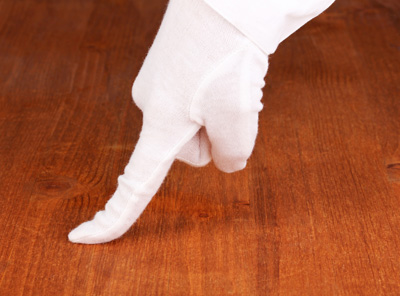
What happens when an immune system isn’t properly trained? Well, it overreacts. It gets irritated by pollen and dust mites. It develops allergies and inflammation. Here are a few alarming statistics:
• The percentage of U.S. children with food allergies rose 50 percent between 1997 and 2011, says the Centers for Disease Control and Prevention.
• Over the same years, the rise in skin allergies was 69 percent, with 12.5 percent of American children having eczema and other skin irritations.
Our organs actually learn how to live with microbes and viruses by overcoming challenges. Thus, by destroying microbes outright, we harm our own immune systems.

More than 50 million Americans experience various types of allergies each year. Allergies are the 6th leading cause of chronic illness in the U.S. For different autoimmune conditions, incidents are increasing between 3% and 9% year to year.
There are more than 80 distinct autoimmune diseases. Taken together, they affect over 23 million Americans, says the National Institute for Health (NIH). The American Autoimmune Related Diseases Association (AARDA) estimates the true number is more than twice the NIH figure. Both figures are pre-COVID. What will happen in the future is hard to project.
Our immune systems become disrupted if they don’t get constant interaction with the rest of the natural world. “Our immune system needs a job,” said one researcher. “We evolved over millions of years to have our immune systems under constant assault. Now they don’t have anything to do.”
There is reason to believe that our continuing use of hand sanitizers and anti-bacterial soaps may lead to increased allergies and autoimmune diseases. It’s a situation parallel to what we’ve learned about antibiotics: The too-frequent consumption of antibiotics can lead--and is already leading--to better-adapted disease organisms.
Do some of us over-protect? Will we face, in the wake of COVID, a rash of allergies and autoimmune disorders? Tough to predict. But I venture to guess that there won't be a drop. It’s really just a matter of how big the increase will be and how long that wave will last.
We do know that excessive protection from bacteria and viruses does ultimately impair the human immune system. So, a balance needs to be found. By all means, obey the regulations of local and state governments regarding masks and social distancing. But also keep in mind that your best protection is a strong immune system.

That system must be trained. Eat berries and fruits straight from the tree or as close as you can get. Now that you’re not hanging out with people so much, hang out in nature. Be unafraid to get on your hands and knees on the grass or dirt. The article that I mentioned above, written by the epidemiologist, will give you even more radical ideas. If you have children, I recommend you look up the book called Dirt is Good: The Advantage of Germs for Your Child's Developing Immune System.
Your Immune System... Your Skin.... Must be Challenged
It’s a familiar notion…Developing strong muscles means challenging those muscles. Building strong character requires challenges. An active and strong immune system needs challenge. To have a beautiful complexion, your skin must be challenged with daily exfoliation and stimulation.
Make a good assessment of where you are skin-wise at this very moment. If your skin is especially sensitive, address sensitivity with diet. Then start training your skin. That training can be as gentle and gradual as you like.
For example, start with applying a facial mask just once a week for two or three minutes, then twice a week, and so on, until you progress to doing it daily. Of course, your success depends also on the nature of the mask you’re using.


